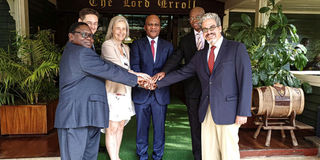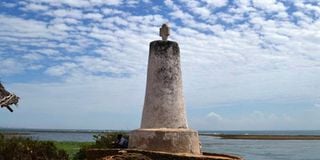Lusophone diplomats in bid to popularise Portuguese language in Africa

Brazilian Ambassador to Kenya Fernando Coimbra (right), Mozambican Charge d’Affaires in Kenya Martin Kumanga (left), Ms Luisa Fragoso the Portuguese Ambassador to Kenya and Angola’s Samuel Abilio Sianga pose with other diplomats after a meeting in Nairobi. The envoys are seeking to popularise the Portuguese language in Africa.
In 1498, Portuguese explorer Vasco da Gama arrived in Mombasa, becoming the first European sailor to touch base with Africa’s East Coast.
His story, lifted from centuries of folklore in Coast, has often represented him as both a pirate and a royal ambassador: He never intended to settle down, but wanted to control the Indian Ocean navigation of a sea route to India.
But the impact of that trip is witnessed in today’s words in Swahili such as familia (family), meza (table), bendera (flag), which are originally Portuguese.
Since his departure, the Portuguese influence both in language and deed has been limited to that brief historical interaction such as a monument in Malindi.

The Vasco da Gama pillar in Malindi, Kenya's coast.
Portuguese language centre
Now a group of diplomats from countries that speak Portuguese want to retrace the interaction and hope to attract more Kenyans to learn the language. The ambassadors of Portugal, Brazil, Angola and Mozambique will launched a Portuguese Language Centre at the University of Nairobi Wednesday.
“We always intended to get the language recognised as an official language of international organisations such as UN, AU and others. This task has been accomplished,” said Samuel Abilio Sianga, Angola’s Ambassador to Kenya, speaking on behalf of ambassadors Luisa Fragoso of Portugal, Fernando Coimbra of Brazil and Martin Kumanga, Charge D’Affaires of Mozambique.
Together with 12 others across the world, these countries form the Community of Portuguese Speaking Countries (CPLP). Formed in 1996, they celebrated their 25th anniversary.
Mr Sianga said the purpose of marketing Portuguese is to improve interactions between Lusophone and other parts of the continent.
“The intention is not to make the language expand suddenly. When it comes to language, we cannot look for a satisfactory limit of expansion,” he told the Nation in an interview.
“It grows day by the day, taking different forms. If we consider China as a very important partner of Africa, they are also in parts of the world like Brazil and the Chinese are speaking Portuguese already.
“This is one way this language will expand. There is no satisfactory limit because it is a dynamic situation when it comes to language.”
They are banking on an “indelible mark” left by Vasco da Gama and his fleet of ships that passed through the East African coast in the 15th Century to attract learners.
The language if one of the six official languages at the African Union. In Africa, it is an official language in Mozambique, Angola, Cape Verde, Guinea-Bissau, Equatorial Guinea, Cape Verde, and Sao Tome and Principe. Globally, some 260 million people speak Portuguese, but most of them are native speakers, mostly in Portugal and Brazil.
“Our motivation is based on the fact that a large number of people speak Portuguese and this language is widely spoken by 260 million speaker sin the world, including 230 million native speakers. It is spoken more by native speakers than some of the most widely studied foreign languages such as French or German,” Mr Sianga said.
Identity and culture
Twelve years ago, the CPLP chose May 5 of every year as the International Day of Portuguese to celebrate what they called “a Portuguese-speaking identity and culture”.
“As far as our group is concerned, we do promote activities to express the culture of the Portuguese people. Language is an element of culture, which is important,” Mr Sianga told the Nation.
Portuguese has often trailed other Western languages such as English and French. Given its smaller economy, Portugal also had a thinner interaction in Africa with fewer colonies compared to France and the UK.
The envoys say, however, that a modern world of interaction relies heavily on communities learning from each other their culture, language and business.
“In today’s environment and being in an international arena, adaptation to cross-cultural situation is very important, not only for the political and cultural relationship, but also in business.
“Even though Kenya is not a Portuguese speaking country, Lusophone countries are developing very close relations with Kenya. Language itself is not a barrier per se because the people will always learn from one another.”
Already Portugal has collaborated with Kenya to train diplomats serving in Lusophone countries. CPLP sees the number of Portuguese speakers rising by 30 per cent in 2050 and doubling today’s numbers to 500 million by the end of the century.
It will be through a campaign pushed by Brazil and Portugal where the language will be taught in non-speaking countries.
“It is our mission and same challenge, as ambassadors, that we may have more Kenyan citizens [becoming] familiar with our language, the Portuguese Language,” the diplomats said in a joint statement ahead of the commemoration.





